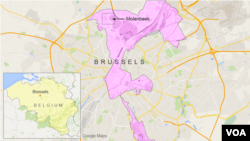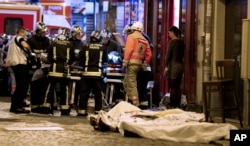Politicians often point to large-scale political events and social factors, from Western intervention in the Mideast to high youth unemployment, to try to explain why young Western Muslims join the Islamic State militant group and al-Qaida, but kinship, family ties and friendship play a key role in jihadist recruiting say radicalization experts.
Those ties make it harder for intelligence agencies to penetrate terror cells and complicate de-radicalization strategies.
Ties of kinship and friendship buttressed the network of killers who unleashed the attacks last month in Paris that left 130 dead and more than 350 injured.
Two of the attackers, Brahim Abdeslam and Salah Abdeslam, were brothers. And they were close friends from childhood with Abdelhamid Abaaoud, the ringleader of the Paris attack cell, who died alongside a 26-year-old female cousin in a shoot-out in the Paris suburb of Saint Denis a few days after the November 13 attacks.
“Most of the French-speaking fighters who left for Syria come from Brussels and the suburbs, and recruitment has been structured around a pre-existing kinship network with Abdelhamid Abaaoud as one of the key figures bringing together friends and family members,” says Rik Coolsaet, a university professor and senior fellow at the Egmont Institute, an independent research organization based in the Belgian capital.
It was in the run-down Brussels suburb of Molenbeek the childhood friendship between the Abdeslam brothers and the 27-year-old Abaaoud, a Belgian of Moroccan descent, was cemented in early adulthood via petty crime and then terrorism. Abaaoud and Salah Abdeslam, who has eluded a massive Europe-wide manhunt and may now be in Syria, were arrested in December 2010 for attempting to break into a parking garage and they served time together in prison.
“Kinship plays a very important role,” says Pieter Ostaeyen, who has been studying Islamic extremism and maintains a database on Belgian and Dutch jihadists. “At its most dramatic you saw it with Abdelhamid Abaaoud recruiting his 13-year-old brother, Younes,” Ostaeyen says.
The Paris attack ringleader used the pretext of a trip in 2014 to visit his grandfather in Morocco to take Younes to Turkey before crossing into Syria. In January, their father, Omar Abaaoud told Belgian newspaper Het Laatste Nieuws he could “never forgive” his eldest son for “brainwashing” his young brother, and “bringing shame to our family.”
Younes, via social media sites, has promised to return to Europe from Syria to avenge his brother’s death at the hands of the French paramilitary counter-terrorism unit, RAID.
The Paris attack cell is not the only jihadist terror network built on kinship and friendships forged in childhood, jail or as petty criminals in closely knit poor neighborhoods.
All those ties underpinned the network known as the Buttes-Chaumont group in France, which was established by Farid Benyettou, a onetime self-appointed extremist preacher who radicalized Cherif and Said Kouachi, the French-born brothers of Algerian origin who attacked the editorial offices of the satirical magazine Charlie Hebdo last January.
Key factors in recruitment
According to social anthropologist Scott Atran of the Centre National de la Recherché Scientifique in Paris, friendship and family are key factors in recruitment. In April, he told the U.N. Security Council in a briefing that in Europe, “About three out of every four people who join al-Qaida or IS do so through friends, most of the rest through family or fellow travelers.”
“It is rare, though, that parents are ever aware that their children desire to join the movement,” he added.
Atran noted the recruits are “mostly youth in transitional stages in their lives: students, immigrants, between jobs or mates, having left or about to leave their native family and looking for a new family of friends and fellow travelers with whom they can find significance. Most have had no traditional religious education, and are often ‘born again’ into a socially tight, ideologically narrow, but world-spanning sense of religious mission.”
For counterterror agencies, tight networks of friends and relatives are hard to penetrate. A strong sense of loyalty and the bonds of friendship make it almost impossible to turn a member to persuade them to act as a spy.
2 phases of recuritment
Ostaeyen says he has monitored two phases of kinship and friendship-built recruitment in Belgium. The first came with the now proscribed Sharia4Belgium, a homegrown extremist Islamic group founded in Antwerp by Fouad Belkacem, a petty criminal-turned-radical preacher, who wooed members through street proselytizing. He especially targeted networked delinquents of Moroccan descent.
Once they had gone to Syria, those core early members of Sharia4Belgium started using the Internet to contact friends and family members, urging them to enlist, too. “And now we have another phase with the second wave of recruits also actively seeking to persuade their friends and relatives to join,” Ostaeyen says, adding “It is ongoing.”







